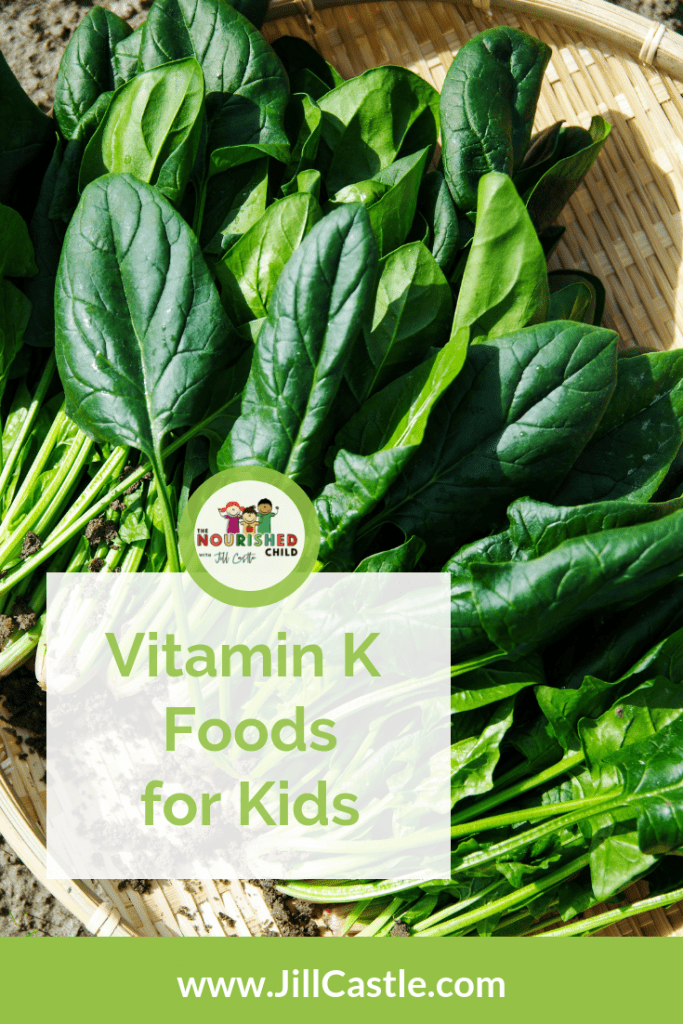Vitamin K for Kids: Daily Need, Uses, and Deficiency
October 20, 2020
We don’t hear much about vitamin K for kids, but it’s an important nutrient for health. Learn about vitamin K and its role in growth, development and health.
Nutritional health isn’t simply demonstrated by good growth and a “healthy” weight, it also relies on optimal levels of nutrients in the body.
In children, this can be tricky to measure because most doctors and pediatric healthcare providers don’t want to take blood from a child unless absolutely necessary.
As a pediatric dietitian, I rely on my own knowledge of diet quality and food balance, as well as clinical observations (looking at the child) of nutrient adequacy.
What is Vitamin K?
Vitamin K is one of the fat-soluble vitamins and it plays a starring role in blood clotting.
It helps stop bleeding and produces 4 of the 13 proteins required for blood clotting.
You can read more about the proteins here.
Vitamin K also helps make other proteins in the body that are important for blood, bone, and kidney health.
Research suggests low levels of vitamin K in the blood is associated with low bone density in adults. Since childhood is the “bone building” period of life, it makes sense to pay attention to this important nutrient for healthy bones.
Additionally, like vitamin D, our bodies can produce vitamin K on its own. We make it from certain bacteria in our digestive system.
However, prolonged or frequent use of antibiotics may destroy vitamin K in the gastrointestinal tract, so we also rely on vitamin K foods to make sure we have enough available.

Why Newborn Babies Need Vitamin K Injections at Birth
When babies are born, they need a vitamin K shot.
This is because they don’t have enough vitamin K in their body to properly clot their blood.
Without this vitamin K supplement, babies are at risk for a bleeding condition called Vitamin K Deficient Bleeding (VKDB), which causes bruising and excessive bleeding in all the organs.
Babies are at risk for this condition during the first 6 months of life because they can’t make this vitamin on their own.
Remember, most of this vitamin is made in our bodies from food and from the bacteria in our gut.
Generally, babies aren’t eating food until age 6 months. (And nursing moms don’t pass enough in their breast milk.)
You might be wondering, why a vitamin K shot instead of a dose of vitamin K by mouth? The shot is more effective at preventing brain bleeding (and permanent brain damage) in infants, and the oral supplement version isn’t available in the U.S.

Forms of Vitamin K: K1 and K2
Vitamin K is a term that includes a group of compounds, as I mentioned. The two most important ones are vitamin K1 and vitamin K2.
Vitamin K1 is found in dark, leafy green vegetables.
K2 is found mostly in meats, cheeses and eggs, and it’s the type of this nutrient created from bacteria.
Vitamin K supplements are typically in the form of vitamin K1.
Amount of Vitamin K for Children:
The levels for optimal vitamin K intake are set as Adequate Intakes (AI), instead of the Recommended Dietary Allowance (RDA).
- 0-6 months: 2.0 micrograms/day
- 7-12 months: 2.5 micrograms/day
- 1-3 years: 30 micrograms/day
- 4-8 years: 55 micrograms/day
- Boys & Girls, 9-13 years: 60 micrograms/day
- Boys & Girls, 14-18 years: 75 micrograms/day
*Adapted from the Institute of Medicine Dietary Reference Intakes
No adverse effects have been reported for intakes above the AI, and there is no Tolerable Upper Intake Level (UL) established.
However, avoiding large doses of vitamin K (ie, from supplements) is advised.

Vitamin K Rich Foods
Collards, spinach and dark leafy greens are the highest food sources of vitamin K, with broccoli, Brussels sprouts, cabbage and bib lettuce containing moderate amounts.
Plant oils (soybean, canola, olive, corn and vegetable oils) and margarine are also good sources.
Can you imagine sautéing collard greens or spinach in canola oil?
A power-punch!
Is There a Risk of Vitamin K Deficiency in Children?
Vitamin K deficiency is extremely rare in the general healthy population.
Those who are deficient in this nutrient tend to have problems with their intestinal functioning, or have taken medications known to interfere with its metabolism.
The Take-Away Messages:
- It’s unlikely that your child, if healthy, will experience a deficiency of this nutrient.
- A diet including green leafy vegetables and plant oils are your best bet for getting enough of this nutrient so your child maintains normal blood clotting and bone health.
- Do you need extra from a supplement? Probably not.
- If you do use a multivitamin supplement, will it be excessive? Probably not.

Learn my super-simple way of keeping track of the nutrients you child needs!
Need More Help with Nutrients for Kids?
Read about other nutrients, such as Vitamin E, Vitamin C, and Vitamin D.
Or, check out our nutrition class, The Nourished Child Blueprint, to get started on nourishing your child, inside and out.
This article was originally published in May 2011 | Updated in October 2020.










